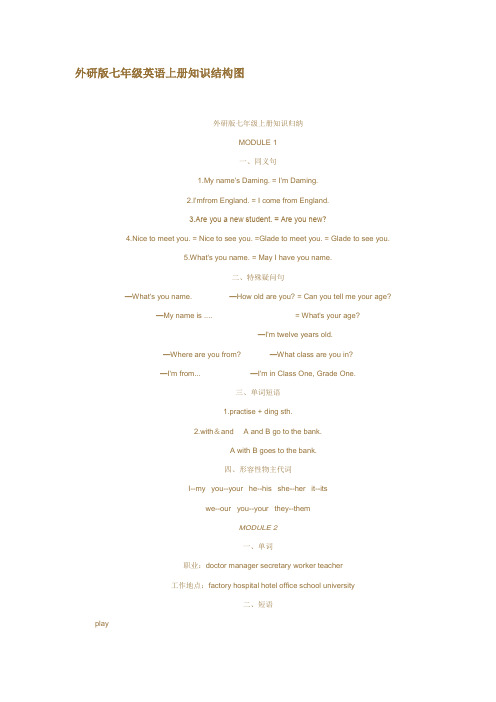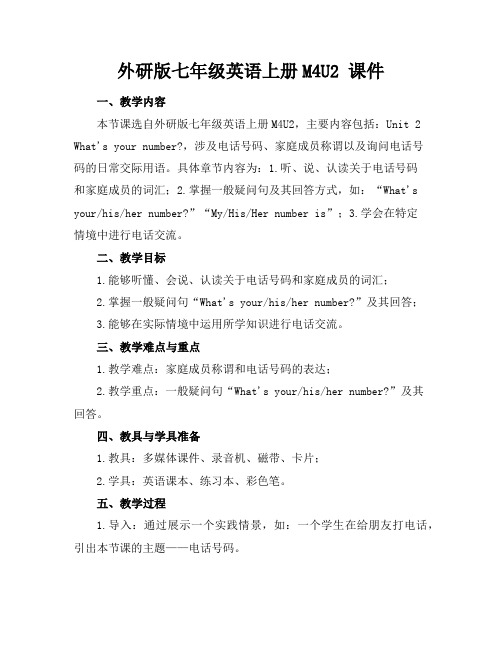初一上册英语M4思维导图外研版
七年级上英语外研版m4知识点

七年级上英语外研版m4知识点外语学习对于我们来说并不是一项轻松的任务,需要大量的时间和精力来学习和巩固知识点。
在学习英语的过程中,M4阶段是七年级学生学习语法和词汇的关键阶段。
接下来将介绍七年级上英语外研版M4的知识点。
1. 一般现在时态在M4阶段,学生需要了解一般现在时态的构成和使用。
一般现在时态用于表达习惯,规律,客观事实以及固定的真理。
其构成为主语+谓语动词的原形。
例如:I swim every day.2. 现在进行时态现在进行时态用于表达正在进行的动作,其构成为主语+be动词+动词-ing形式。
例如:They are playing basketball now.3. 一般过去时态一般过去时态用于表达过去发生的事情,其构成为主语+动词的过去式。
例如:I went to the park yesterday.4. 一般将来时态一般将来时态用于表达将来要发生的事情,其构成为主语+will+谓语动词的原形。
例如:I will go to the party tomorrow.5. 情态动词情态动词用于表达能力,愿望,请求,建议等意义。
常见的情态动词有can,could,should,would等。
例如:I can speak English fluently.6. 名词性从句名词性从句用于作为主语,宾语或者表语,其常见的引导词有that,if,whether,when,where等。
例如:What she said is true.7. 宾语从句宾语从句用于作为主句的宾语,其中常用的引导词有that,if,whether等。
例如:I don't know if he will come or not.8. 短语动词短语动词由动词和介词组成,其形式有及物和不及物两种形式。
例如:She always looks after her younger brother.9. 常用的介词常用的介词有in,on,at,with,to。
外研版七年级英语上册知识结构图

外研版七年级英语上册知识结构图外研版七年级上册知识归纳MODULE 1一、同义句1.My name's Daming. = I'm Daming.2.I'mfrom England. = I come from England.3.Are you a new student. ≈ Are you new?4.Nice to meet you. = Nice to see you. =Glade to meet you. = Glade to see you.5.What's you name. = May I have you name.二、特殊疑问句—What's you name. —How old are you? = Can you tell me your age?—My name is .... = What's your age?—I'm twelve years old.—Where are you from? —What class are you in?—I'm from... —I'm in Class One, Grade One.三、单词短语1.practise + ding sth.2.with&and A and B go to the bank.A withB goes to the bank.四、形容性物主代词I--my you--your he--his she--her it--itswe--our you--your they--themMODULE 2一、单词职业:doctor manager secretary worker teacher工作地点:factory hospital hotel office school university二、短语playbasketballfootballtennistable tennisthe pianoride a bike\horsespeak English\Japanese\Chinesesing (a song)swimfactoriescitiesuniversitiessecretariestwoa photo\picture of my family a universityan office三、语法(can)Can do sth.I can\can't ride a bike.Can you ride a bike?Yes, I can.\No, I can't.四、句子What does your ... do?=What is\are you ...'s job?=What is your ...?He\She is a ... They're ...MODULE 3一、单词1.building in school: classroom dining hall gym library office science lab2.something: blackboard book classroom computer desk dictionary footballlibrary picture television3.numbers: thirteen fourteen fifteen sixteen seventeen eighteen nineteenthirty forty fifty sixty seventy eighty ninety4.介词:next to ≈ near b ehind ≠ in front of in on under5. in front of:在......前面in the front of:在......里面的前面6.right 正确的≠wrong右边的≠left二、语音er、or、ur发/?/三、语法(There be)1.there is/are +sth./sb. + sw.2.How many + n. + are there + sw.----Are there any school offices?----Yes, there are. There are some offices.----Is there a computer on Miss Li's desk?----No, there isn't.注意:1.就近原则:There is some meat and two apples on the desk.2.名词所有格:Miss Li's herLily and Lucy's 两人共有的 eg: Lily and Lucy's father.Lily's and Lucy's 两人各有的Lily's and Lucy's fathers.MODULE 4一、family members:aunt uncle grandma grandmother grandpa grandfather mother father mum dad sisterbrother二、about sth.with sb.短语句型talkThank you for your email.thank (sb.) for sth.thank (sb.) for doing sth.your help.helping me.to sb.it againsayasking me.inviting me.Make a family tree for your family.----How many people are there in your family?----There are four. There are my mum and dad, my sister and me.----Have you got an aunt?/any .....?----Yes,I have./No,I haven't.----Have you got a small family or a big family?----I've got a big family.(选择疑问句)or的用法:①或;②并列否定:I don't like swimming or dancing.MODULE 5-6一、单词1. orange 橙汁have some orange [U]橙色the oranges are orange [C]橙子This is an orange [C]2.Kind 善良He is very kind.种类=tyre a kind / type of fruit two kinds /types of fruits3. gym: 不受天气影响的室内体育馆、健身房或运动馆stadium: 周围有看台的露天大型运动场4.healthy ≠ unhealthy keep/stay healthyin good health ≠ in poor/bad health5.be healthy = be in healthgood for one health ≠ bad for one health二、短语be onfilm starfootball matchespiano lessonsee a filmwatch a magic showride a bike /horsestay at homethe photothe fridgeChina / Beijing2008the daythe morningspringsee a film / see films = go to the cinemaonatthe phonethe playgroundSundaya sunny daythe morning of June 1stin三、----Have you got any ......?----Yes,we have./No,we haven't句型Would you like sth.to do sth.Let's do sth.What's the price of......?Best wish to sb.for teachers' dayI have no time.I don't have time.希望别人得到肯定回答的疑问句用'some' eg: Do you have some money for me?pleaseletwouldcouldcanmustdodoesa cup of teaa glass of watera can of cokea bottle of juicea bowl of ricea piece of meatto do sth.wantwould likeask/invite sb.teachtell四、区别do sth.likepracticeThank you forfinishstarMy hobby isfavourite sport isdoing sth.MODULE 7一、a breakhave Chinese/a Chinese lessonbreakfast/lunch/dinner/supper短语about sth.谈论某事talk to sb. 跟某人谈话(一方讲一方听)sth.(my homework)to do sth.(to do my homework)doing sth.(doing my homework)sth.(my homework)doing sth.(doing my homework)finishstartwith sb. 跟某人谈话(双方都讲)What about/How about youdoing sth.get up≠go to bedgo home≠leave home(for)study science/history/chemistry/maths/...二、语法①时间表达法:(问时间具体几点钟)____ What's the time?What time it is?直读法:It's two ten. (2:10)____ 逆读法:①It's ten past two.(2:10) ≤30'②It's ten to ten. (2:50) >30'整点表达法:It's two o'clock. (2:00)a quarter past two 2:15a quarter to two 2:45half past two 2:30注意:(不用介词)half an hourcut the apple into two halvesWhen do you get up?What time do you get up?When is your birthday / the film?(问日、月、年或某事何时发生)(问具体几点钟做某事)I get up at 7:30.3.②一般现在时(1)【No. 1】一般现在时的功能1.表示事物或人物的特征、状态。
七年级上册外研版module 4的知识点

七年级上册外研版module 4的知识点七年级上册外研版英语的第四个模块主要包括了四个单元,分别是“Do you know London?”, “Where were you born?”, “What do you usually do on weekends?”和“How do you get to school?”1. “Do you know London?”这个单元主要介绍了伦敦的一些地标建筑和文化。
重点知识点有:Big Ben, Buckingham Palace, St Paul’s Cathedral, Thames River 等地标建筑的英文名称和位置描述;Tea Time是英国人的文化习惯;Can you…? 和Yes, I can./ No, I can’t. 的问答句型。
2. “Where were you born?”这个单元主要介绍了动词be的过去式和一些人的出生地和国籍。
重点知识点有:be动词的过去式was /were 的用法;where引导的问句和回答;介绍自己和他人国籍和出生地的常用句型如:I was born in China. I am Chinese.3. “What do you usually do on weekends?”这个单元主要介绍了表示频率的副词和一些周末的活动。
重点知识点有:频率副词的用法如:always, usually, often, sometimes,hardly ever, never;常用的周末活动的表达,如playing basketball, watching TV, visiting grandparents等。
4. “How do you get to school?”这个单元主要介绍了交通工具、方位介词和问路的表达。
重点知识点有:交通工具的名称及其用法,如bus, subway, bike等;方位介词的用法如:in, on, under, next to等;问路时用到的句型如Excuse me, Where is…? How can I get to…? 等。
外研版七年级英语上册(课件):Module 4

2. 我要去买一些食物。(根据汉语意思补全下列句子,
每空一词)
I want to ________ shopping ________ go ________ for some food.
【3】be good for的用法 【教材例句】Too much chocolate isn't good for you.
【举例】There are too many people in the shopping centre. 购物中心有太多的人。 Is watching TV too much good or bad for your health? 电视看得太多对你的健康有益还是有害? I have too much homework to do today. 今天我 有太多的家庭作业要做。 The water is much too hot. 水太热了。 【应用】 ( C )1. I haven't got ________ tomatoes. A. too much B. much too C. too many D. too ( A )2. —Why are you so tired these days? —Well, I have ________ homework to do. A. too much B. too many C. much too D. many too
Module 4 Healthy food
Unit 1 We've got lots of apples.
第一课时 Getting ready & vocabulary
课前导学
核心单词 1. ________ n. 食物,食品 food 2. drink ________ n. 饮料 v. 喝 3. ________ n. 水果 fruit 4. vegetable ________ n. 蔬菜 5. ________ chicken n. 鸡肉 6. ________ n. 土豆,马铃薯 potato 7. ________ v. 购物;逛商店 shop 8. ________ v.aux. (助动词)v. 有;吃,喝 have 9. ________ n. 种类 kind 10. ________ adj. 坏的;不好的 bad
外研社七年级上册Module 4 Unit 3 Language in use (共30张PPT)

good for your health. 3. How many _to_m__a_t_o_e_s (西红柿) have
you got? 4. My favourite meat is _fi_s_h_ (鱼肉).
Guide 1(自学指导一) Countable nouns可数名词(可以计数的)
a carrot
a potato
a tomato
two carrots some carrots
three potatoes some potatoes
three tomatoes some tomatoes
S ( singular单数 )
7. hamburgers 8. noodles 9. leaves 10. vegetables 11. tomatoes 12. Chinese 13. children 14. teeth
Unountable nouns不可数名词(不可以计数的)
some coffee a cup of coffee some water a bottle of water
fish
some fish
beef some beef
chicken some chicken
不可数名词 No “a/an”! No “s”!
True(T) or False(F)
(T) some juice
(F) a milk some milk (F) some tomato
some tomatoes (F) a beef
外研版七年级英语上册M4U2课件

外研版七年级英语上册M4U2 课件一、教学内容本节课选自外研版七年级英语上册M4U2,主要内容包括:Unit 2 What's your number?,涉及电话号码、家庭成员称谓以及询问电话号码的日常交际用语。
具体章节内容为:1.听、说、认读关于电话号码和家庭成员的词汇;2.掌握一般疑问句及其回答方式,如:“What's your/his/her number?”“My/His/Her number is”;3.学会在特定情境中进行电话交流。
二、教学目标1.能够听懂、会说、认读关于电话号码和家庭成员的词汇;2.掌握一般疑问句“What's your/his/her number?”及其回答;3.能够在实际情境中运用所学知识进行电话交流。
三、教学难点与重点1.教学难点:家庭成员称谓和电话号码的表达;2.教学重点:一般疑问句“What's your/his/her number?”及其回答。
四、教具与学具准备1.教具:多媒体课件、录音机、磁带、卡片;2.学具:英语课本、练习本、彩色笔。
五、教学过程1.导入:通过展示一个实践情景,如:一个学生在给朋友打电话,引出本节课的主题——电话号码。
2.新知呈现:展示多媒体课件,学习关于电话号码和家庭成员的词汇,引导学生跟读、模仿。
3.例题讲解:呈现例题,讲解一般疑问句“What's your/his/her number?”及其回答,引导学生进行角色扮演,进行实际操作。
4.随堂练习:学生两人一组,进行电话交流的角色扮演,巩固所学知识。
5.巩固拓展:通过游戏、竞赛等形式,让学生在轻松愉快的氛围中复习所学知识。
六、板书设计1.What's your number?2.词汇:phone number, mother, father, sister, brother, grandpa, grandma等;3.句子:What's your/his/her number? My/His/Her number is七、作业设计1.作业题目:完成练习册上的相关习题;2.答案:见附件。
初中英语M4Education单元教学设计以及思维导图

M4 Education适用年级八年级所需时间课内6课时(每周4课时),课外1-2课时。
主题单元学习概述本模块以希望工程为主题,同时介绍世界各地的慈善机构。
通过本模块的学习,学生可以了解希望工程,了解不同地区儿童的学习情况,了解各国、各界人士的善举。
教材在介绍希望工程时,会用到现在完成时,以及for和since表达行为持续时间的用法。
通过对希望工程等话题的探讨,培养学生正确使用现在完成时的能力。
教学中应结合学生实际情况,灵活调整教学内容(或增加,或删除,或前后调整),合理设置课时。
适当进行拓展,以丰富学生知识,拓展学生视野,进行理想、责任的教育。
本专题模块可以划分为三个单元。
专题一:Unit1 How long have you studied English?专题二:Unit2Project Hope has built many schools.专题三:Unit3 Languagein useUnit 1 结合时间谈论某个事件,尤其是与学校教育有关的话题,重点学习since和for在现在完成时中的用法。
Unit 2 练习数字的读法;学习关于希望工程的课文,继续学习现在完成时所表达的含义;学习本单元重点词汇;用关联词but, and, or合并句子。
Unit 3 在练习中复现本单元重点词汇、句型和语法;读关于Oxfam的文章;制作一张希望工程传单为希望学校募捐。
本主题模块学习方法主要有:情境学习,问题学习,合作学习,探究学习。
预期的学习成果:正确使用现在完成时及相关时间状语的能力。
适当进行拓展,以丰富学生知识,拓展学生视野,进行理想、责任的教育。
主题单元规划思维导图主题单元学习目标知识与技能:能正确使用下列单词:study ,teach, headteacher, since, same, poor, project, raise, ill, pay, train,for理解下列词组:hearabout, organisation, leaflet2.词组句型能正确运用下列短语:get onwell with, take part, drop out of school , hear of能熟练运用下列句型:How long…?For…,since…语法能够正确使用for和since时间状语,并用How long 提问。
七年级英语上学期module4外研英语

